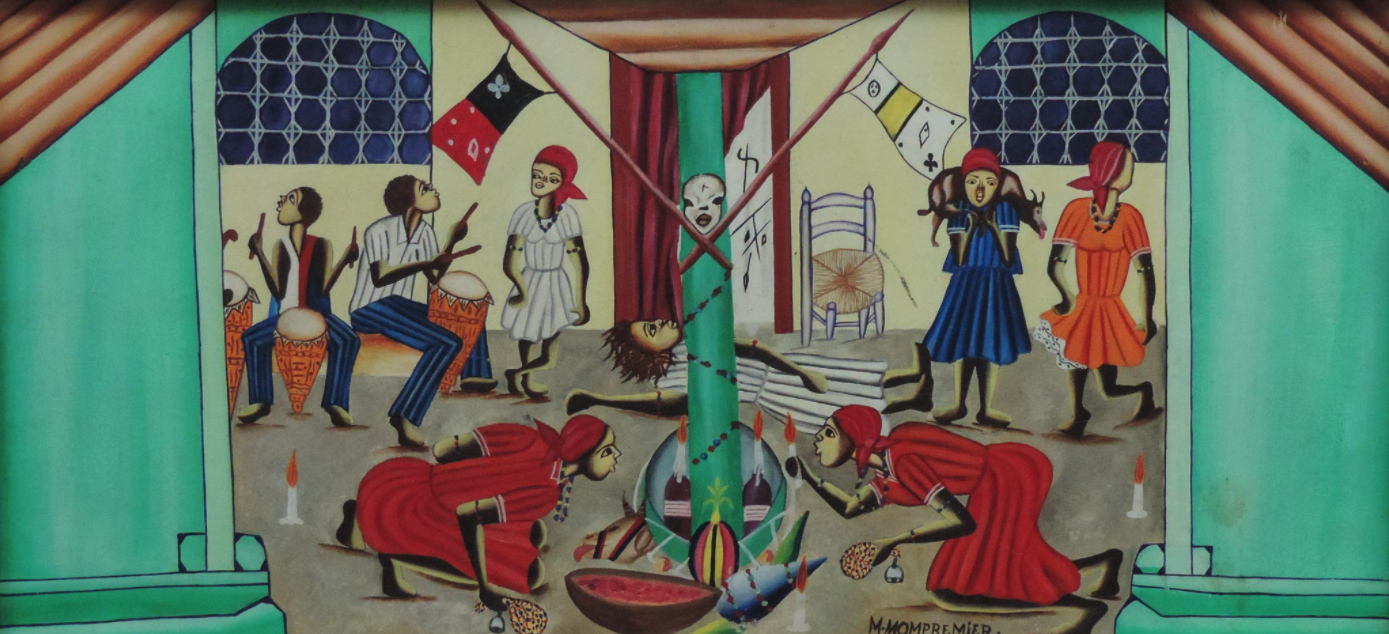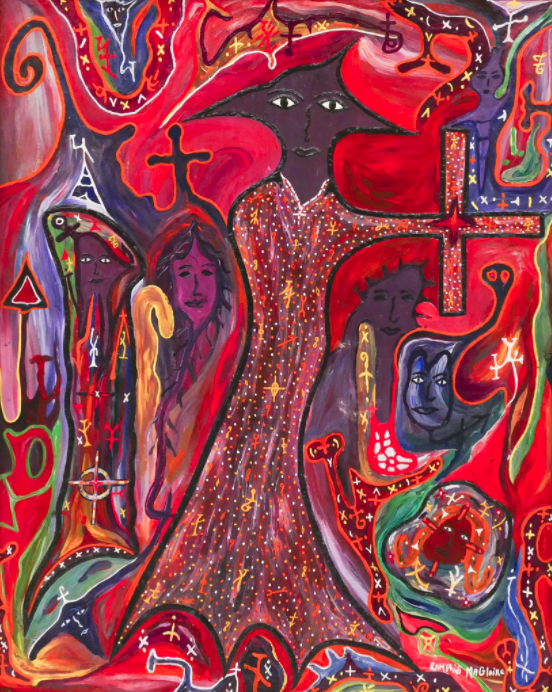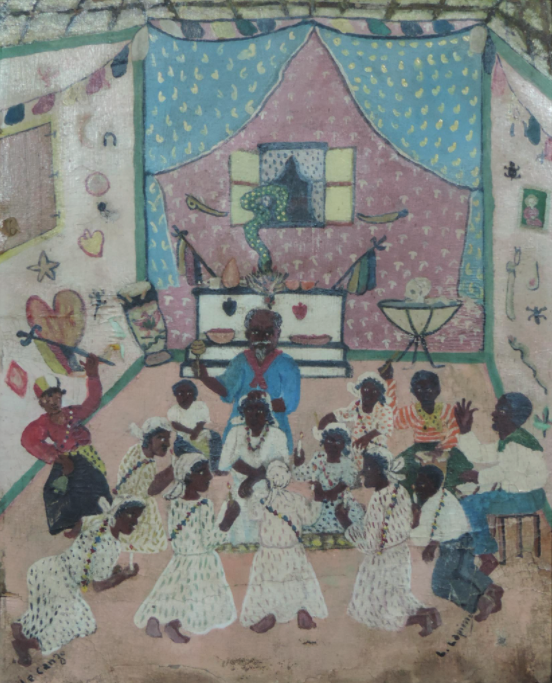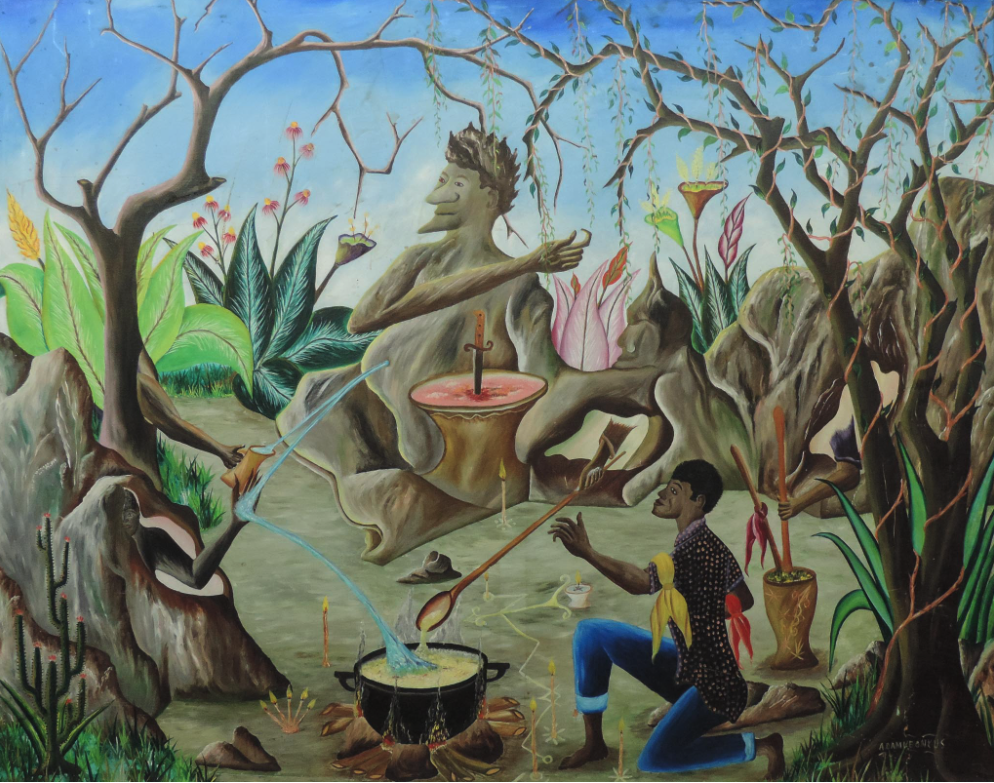For this week's Black History Month series at the Quixote Center, our board member Serge Hyacinthe explains the cultural and historical significance of Haitian vodou, and how it is often misrepresented.
[caption id="attachment_10231" align="alignnone" width="904"] Vodou Ceremony (1980s) Madsen Mompremier, Courtesy of Haitian Art Society[/caption]
Vodou Ceremony (1980s) Madsen Mompremier, Courtesy of Haitian Art Society[/caption]
By Serge Hyacinthe & Dr. Sandra Duval
[caption id="attachment_10232" align="alignright" width="380"] Vodou Spirits (1990) Ramphis Magloire, Courtesy of Haitian Art Society[/caption]
Vodou Spirits (1990) Ramphis Magloire, Courtesy of Haitian Art Society[/caption]
Archeologists and ethnographers can attest that since the dawn of time, humans in every culture have left artifacts that gave us clues to their responses to questions about creation and the afterlife. So, understandably, African civilizations have also used creation myths to explain the cosmos, the elements of nature, human conditions, and their relationship with the transcendent. Over time, they have developed technologies and honed different ways of knowing to explain and interact with the universe around them. For example, the Dogon people of Mali knew the location of the star Sothis (Sirius) centuries before western technologies enabled us to see it. Ancient civilizations understood the impact of nature on daily life - from floods to tides, weather, fertility, and harvests. Science and spirituality were not separated. As people moved voluntarily and involuntarily to the Americas, they carried their faiths, beliefs, and knowledge with them.
In dire times when faced with overwhelming grief, impossible feats, calamities and the prospect of death, many instinctively summoned the spirits and the Creator. For example, it was noted that during the Constitutional Convention of June 28, 1787, Benjamin Franklin had reminded his fellow citizens that their prayers were always answered during the war against England. Americans triumphed over stronger opponents on many occasions. He stressed that they should continue to seek God's help as they write the constitution and build their empire. He states, “God governs the affairs of men…is it probable that an empire can rise without his aid?”. Likewise, the enslaved habitants of Haiti plead for the support of their Creator in their affairs - to unleash the chains which separated them from their families, land, language - their very identity, their name. Their way of life was based on Vodou principles. Vodou helped them survive in a place so harsh that their lifespan was reduced to a mere 21 years.
The most commonly referred and earliest presence of Vodou in Haitian history takes place in August 1791 at the infamous Bois Caiman (Bwa Kay Iman) ceremony. Faced with enslavement and the most atrocious and barbarous conditions, over two hundred of our Haitian forefathers and mothers from various plantations came together for a Vodou ceremony and called upon the Creator to give them the strength and courage to take on one of the most formidable empires of modern history. Imbued by the spirit of the God within, they swore to take on their oppressors and fight for their liberty to the death. Their act of faith led to what is still considered by historians as one of the greatest military upsets and the only successful slave revolution that has culminated in the formation of an independent Country. The mere survival of the Haitian people and state for over two centuries in the shadows of great imperial aggression and conquests is a demonstration of Haitian Spirituality.
[caption id="attachment_10233" align="alignleft" width="389"] Vodou Ceremony (1940-50s) Leon LePierre, Courtesy of Haitian Art Society[/caption]
Vodou Ceremony (1940-50s) Leon LePierre, Courtesy of Haitian Art Society[/caption]
Vodou, much like Santeria in Cuba and Candomble in Brazil, is one of the syncretic religious expressions that have emerged in the African Diaspora. They emanate from the shared experience of expropriating black bodies from the shores of Africa to their enslavement in the Americas and the Caribbean where all expression of native religion and culture was forbidden and a complete rupture from everything African was attempted. More than a religion, Vodou is a way of life and a comprehensive belief that merges the relationship to the Creator and nature and therefore is present in all aspects of life. It includes a connection with cosmic energies that harmonizes the sacred and the profane, the material and the spiritual, and the world of the living with that of the ancestors and the Lwa. The lwas represent the diversity of characteristics and expressions in the cosmos. Vodou believes in the sanctity and unitary God and shares some common denominator and universal ethical principles with other world religions. Among them are a strong sense of justice and service, respect for elders, benevolence and harmony with the environment. This includes harnessing the characteristics of plants and nature for wellbeing and healing. Vodou temples, oumfo, and ceremonies are led by an ougan priest or mambo priestess who are equal in stature and operate in a nondiscriminatory or hierarchical gender order.
Ethnocentrism and two centuries of sustained attacks have led to its misunderstanding and malignment. Overt practices are historically shunned and adherents often prosecuted, physically harmed, and even killed. One of the genesis of the attacks is the 1860 Concordat which the Haitian leaders, faced with complete isolation, signed with the Vatican. It granted the Catholic Church free reign to educate. The church unofficially gained religious monopoly and supremacy. French priests were sent to enforce and maintain the religion while denigrating the indigenous spirituality and culture. Under the banner of anti-superstition, at least thirteen Catholic church and state-sanctioned campaigns were conducted from 1896 to 1942 which resulted in countless deaths, the burning of Vodou temples, and the destruction of artifacts. The American Occupation of 1915 led to further debasement and attacks with the US media and Hollywood supplying an endless barrage of sensationalized and racist stories and nefarious depictions. The machination of mythic creations such as the diabolical Zombies and voodou dolls depicted in those movies still serve as a backdrop to popular perceptions of Vodou. Christian Evangelical extremists with their racist and intolerant theology have further contributed to the propaganda machinery and blame Haiti's underdevelopment which is tied to two centuries of foreign, including American, exploitation and even the devastating quake of 2010 which killed over 225,000 people to voodoo.
[caption id="attachment_10229" align="alignright" width="415"] Vodou Ceremony (1960s) Adam Leontus, Courtesy of Haitian Art Society[/caption]
Vodou Ceremony (1960s) Adam Leontus, Courtesy of Haitian Art Society[/caption]
Notwithstanding, the enormous and longstanding pressures and attacks, Vodou is ingrained and has become more institutionalized and understood. A number of Haitian intellectuals such as Max Beauvoir, Patrick Bellegarde-Smith, and others have invested in literary works and projects to dispel the myths and disseminate accurate information about the ethnography, practices, and norms of Vodou. In the late '80s, Haiti witnessed a social reckoning against the cultural elite and sought ways to embrace and honor its African roots. The 1987 Haitian constitution eliminated the ban on the practice of Vodou and for the first time acknowledged it as a legitimate religion and national treasure. The normalization and open acceptance of Vodou is still in progress, but the demonization of its adherents and practices is roundly rejected by many.

